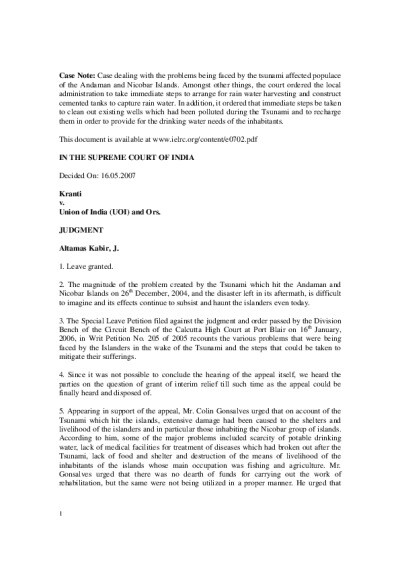
Date
Geographical Area
South Asia
Countries
India
Keywords
Case Name
Kranti v. Union of India (UOI) & Ors
Case Reference
Civil Appeal No. 2681/2007
Name of Court
Supreme Court of India
Key Facts
This case concerns the effects of the 2004 tsunami on the inhabitants of the Andaman and Nicobar Islands. Following the tsunami, the islands suffered extensive damage and the population faced very serious problems.
The Plaintiffs argued that the main issues included the lack of shelter, drinking water, food, adequate medical facilities and the opportunity to earn a livelihood. It was also argued that there were sufficient funds to remedy these issues but that they were not correctly applied.
All claims for relief were to be made to the local court ‘Lok Adalats’ which was located in Port Blair. This meant that some of those affected had to travel for over a week in order to make a claim as the transport system was lacking on the islands.
Other issues faced by the inhabitants of the island included the unsuitability of shelters and the fact that the majority of fishermen whose boats had been damaged in the tsunami had not received adequate replacements.
The Plaintiffs argued that the main issues included the lack of shelter, drinking water, food, adequate medical facilities and the opportunity to earn a livelihood. It was also argued that there were sufficient funds to remedy these issues but that they were not correctly applied.
All claims for relief were to be made to the local court ‘Lok Adalats’ which was located in Port Blair. This meant that some of those affected had to travel for over a week in order to make a claim as the transport system was lacking on the islands.
Other issues faced by the inhabitants of the island included the unsuitability of shelters and the fact that the majority of fishermen whose boats had been damaged in the tsunami had not received adequate replacements.
Decision and Reasoning
The Court held that as interim relief steps must be immediately taken by the Local Administration to provide drinking water to the Island’s inhabitants. This is to be accomplished by capturing water from the monsoons in cement tanks, cleaning the existing wells which had been polluted by the tsunami, and by digging new wells if required.
The dry rations being supplied to families should continue until October 2007 or until the appeal has been heard, whichever is first. Additionally, the Administration may consider providing an additional cooking gas cylinder to those affected. The administration is entitled to make enquiries into those receiving the rations and discontinue them if the family is no longer in need.
The Court suggested that the affected fishermen should be given replacement boats as soon as possible and that additional doctors should be placed on the islands. However, these were not explicitly ordered.
The dry rations being supplied to families should continue until October 2007 or until the appeal has been heard, whichever is first. Additionally, the Administration may consider providing an additional cooking gas cylinder to those affected. The administration is entitled to make enquiries into those receiving the rations and discontinue them if the family is no longer in need.
The Court suggested that the affected fishermen should be given replacement boats as soon as possible and that additional doctors should be placed on the islands. However, these were not explicitly ordered.
Outcome
The Court concluded that despite genuine efforts to relieve the effects of the tsunami on the inhabitants of the islands, there remained a great deal of work to be done in order to improve the lives of those affected by the disaster.
The Court also noted that the beginning of monsoon season would further exacerbate the living conditions of the inhabitants. As a result, it was necessary that the key areas of safe drinking water and provision of food were prioritised.
A further notice was made by the Supreme Court on 9 April 2013 highlighting the need for finalisation of the support works, including the hand-over of 280 shelters to the beneficiaries on the islands, and the resolution of pending claims for support within six months.
The Court also noted that the beginning of monsoon season would further exacerbate the living conditions of the inhabitants. As a result, it was necessary that the key areas of safe drinking water and provision of food were prioritised.
A further notice was made by the Supreme Court on 9 April 2013 highlighting the need for finalisation of the support works, including the hand-over of 280 shelters to the beneficiaries on the islands, and the resolution of pending claims for support within six months.
Disclaimer
This case law summary was developed as part of the Disaster Law Database (DISLAW) project, and is not an official record of the case.
Document
Document